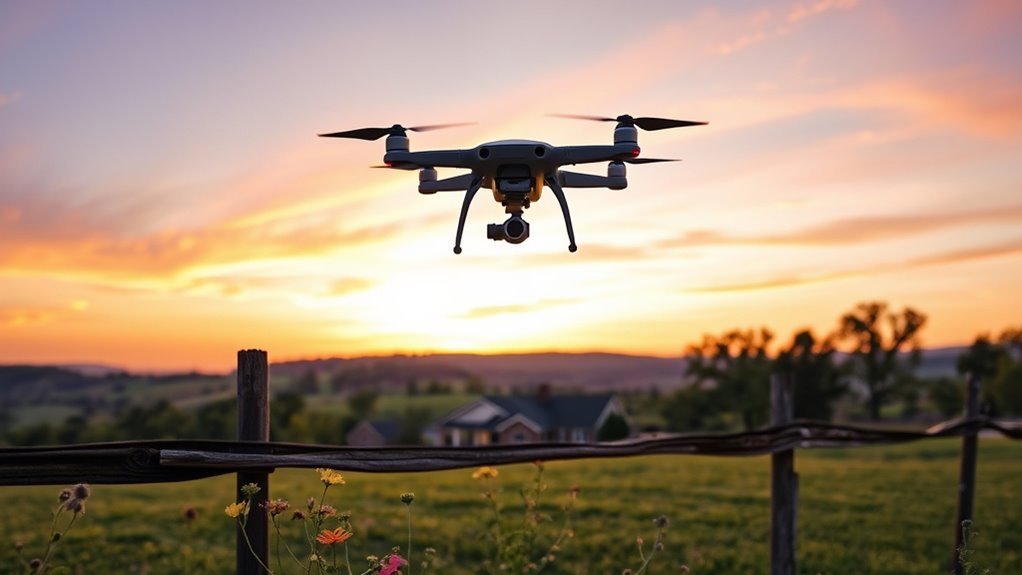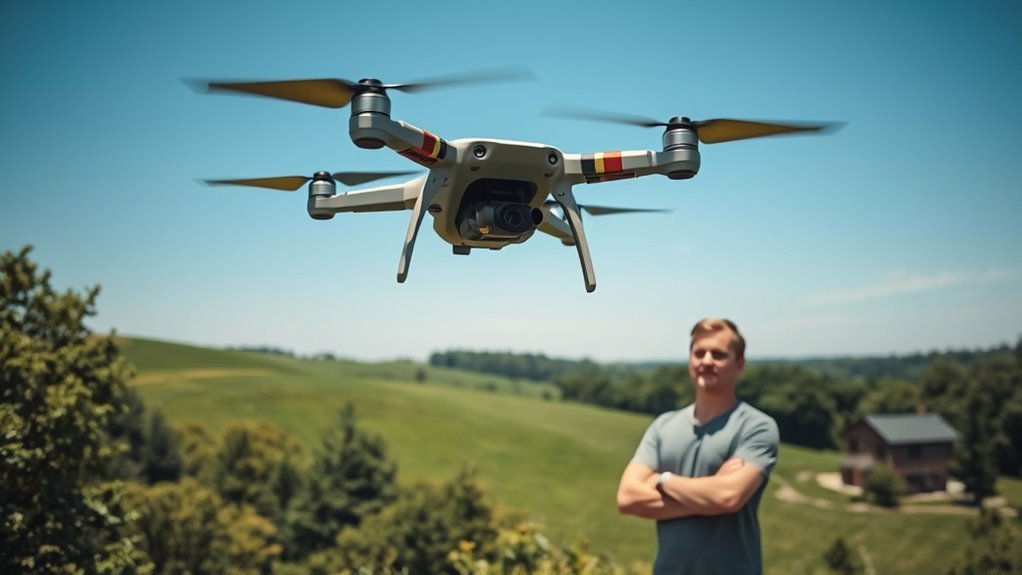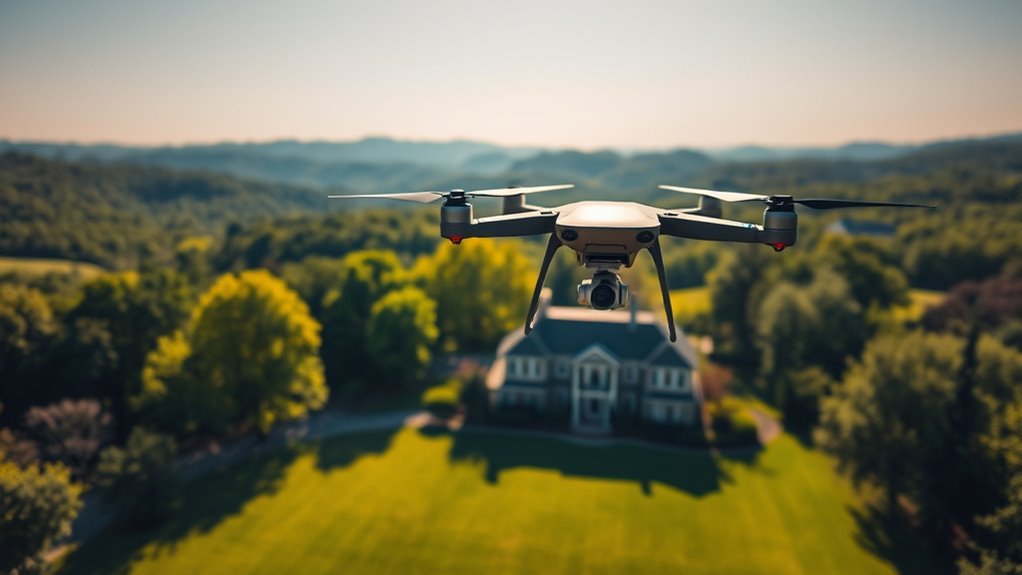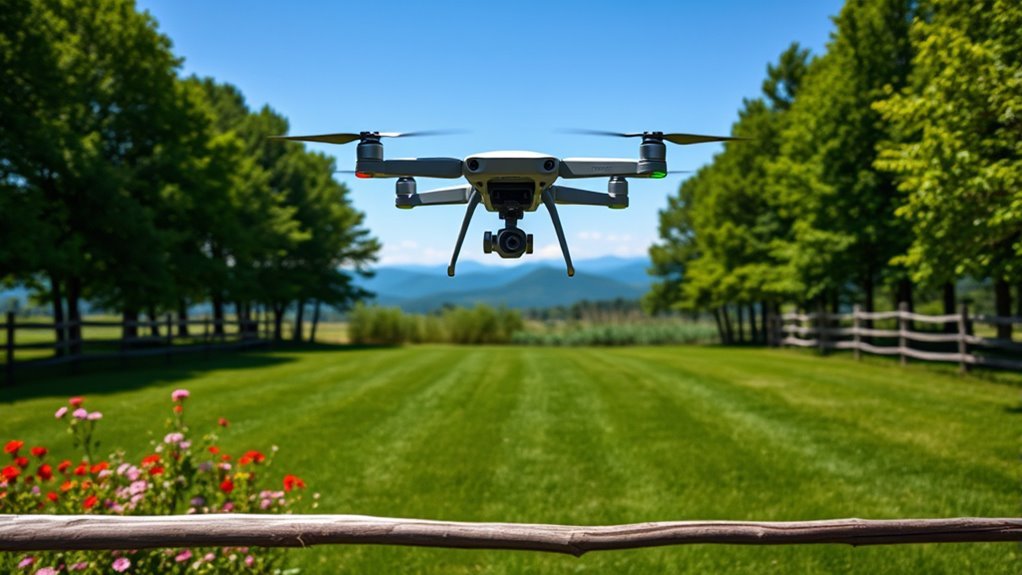Shooting a drone over your Virginia property can result in serious legal repercussions. It may be classified as reckless endangerment or destruction of property, exposing you to criminal charges. Additionally, homeowner’s insurance may not cover any damages caused. It is crucial to understand your rights and the regulations governing drone use in your area. Exploring appropriate legal avenues may provide better resolution options. Discover more about the legal framework surrounding drone use in Virginia.
Understanding Drone Regulations in Virginia

While you may think you’re free to fly a drone over your property in Virginia, it is vital to understand the regulations that govern such activities. Drone technology has advanced rapidly, but with this freedom comes regulatory challenges. Virginia law requires compliance with both federal and state regulations, including the FAA’s guidelines. You must avoid flying over private property without permission and respect no-fly zones, especially near airports and populated areas. Additionally, local ordinances may impose further restrictions. Ignoring these laws can lead to fines or legal action. As a result, staying informed about the evolving regulatory landscape is essential for responsible drone operation, ensuring your freedom doesn’t infringe on the rights of others or violate legal statutes. Furthermore, awareness of restricted zones is crucial to avoid potential penalties and ensure compliance with safety regulations. Be mindful that federal laws classify drones as aircraft, and shooting one down could lead to serious legal consequences.
The Legal Framework Surrounding Drones

Understanding the regulations is just the beginning; the legal framework surrounding drones encompasses a complex interplay of federal, state, and local laws. As you navigate this landscape, consider these critical points regarding drone technology and its legal implications:
- Federal Regulations: The FAA regulates airspace and requires registration for drones over a certain weight.
- State Laws: Virginia has specific statutes addressing drone use, including privacy concerns and unauthorized surveillance.
- Local Ordinances: Cities may impose additional restrictions, impacting where and how drones can be operated.
Being informed about these layers of law is essential for exercising your rights while ensuring compliance. Understanding this legal framework not only empowers you but also helps protect your freedoms in an evolving technological landscape.
Property Rights and Airspace Ownership

When considering airspace ownership, it’s important to understand that property rights extend upwards, but not indefinitely. You typically own the airspace above your property to a certain altitude, which is governed by both state and federal laws. Knowing these laws can clarify your rights regarding drones operating in that airspace.
Airspace Ownership Laws
Airspace ownership laws dictate that property rights extend vertically above your land, but this concept is nuanced and often subject to interpretation. Understanding your airspace boundaries is vital, especially when it comes to drone regulations. Here are three key points to reflect on:
- Vertical Limitations: You generally own airspace only to a certain altitude, beyond which federal regulations apply.
- Drone Operations: Drones must operate within specific altitudes and regulations, impacting your rights.
- Legal Precedents: Courts have ruled differently on airspace ownership, highlighting the importance of local laws.
Navigating the complexities of airspace ownership can empower you in asserting your rights while ensuring compliance with drone regulations. Always stay informed to protect your freedoms and property.
Property Rights Explained
Property rights encompass more than just the land you own; they extend vertically into the airspace above it, creating a complex interplay between private ownership and regulatory frameworks. You have what’s known as air rights, which grant you some authority over the space above your property. However, drone ownership introduces challenges to these rights. Government regulations, including the Federal Aviation Administration’s guidelines, often take precedence, restricting how you can exercise your air rights. While you may feel passionate about defending your property, understanding the legal boundaries is essential. Shooting down a drone could lead to serious legal consequences, as it might infringe upon federal airspace laws and potentially result in liability for damages. Always consider the legal implications before acting.
Privacy Concerns Related to Drone Surveillance
As drones become increasingly prevalent in both commercial and recreational use, concerns about privacy have surged among property owners. The rise of drone surveillance raises vital issues regarding individual freedoms and property rights. Some key privacy concerns include:
- Unauthorized Monitoring: Drones can capture images and videos without consent, leading to potential privacy invasions.
- Data Collection: Drones equipped with cameras may collect personal data, which could be misused or mishandled.
- Chilling Effect: The presence of drones might deter individuals from enjoying their property freely, fearing surveillance.
Understanding these concerns is important for protecting your rights. While drones offer innovative opportunities, they also pose significant risks to your privacy and autonomy. It’s important to stay informed and assert your rights against unwarranted drone surveillance.
When Can Drones Legally Fly Over Your Property?
Understanding privacy concerns is essential when considering the legalities of drone use. Drones can legally fly over your property under certain conditions defined by drone flight regulations. Generally, they must operate at legal altitudes and avoid violating aerial privacy rights. Here’s a quick overview:
| Condition | Legal Status | Notes |
|---|---|---|
| Flight Altitude Above | Legal | Must be below 400 feet |
| Over Private Property | Legal if visible | Must not invade privacy |
| Emergency Situations | Legal | May fly lower if necessary |
| Commercial Use | Regulated | Requires permits |
| Recreational Use | Generally Legal | Follow local laws |
Always stay informed about local ordinances to guarantee compliance with regulations while protecting your rights. Additionally, understanding Connecticut’s drone regulations is crucial for safe and legal drone operations.
Potential Consequences of Shooting a Drone
While you might feel justified in shooting down a drone that’s invading your privacy, doing so can lead to significant legal repercussions. Engaging in such an act could expose you to serious consequences, including:
- Legal Liability: You may face civil lawsuits for damages caused by your actions.
- Criminal Charges: Depending on the circumstances, you could be charged with reckless endangerment or destruction of property.
- Insurance Issues: Your homeowner’s insurance may not cover drone damage, leaving you financially responsible.
In the eyes of the law, shooting a drone can be viewed as a dangerous act, regardless of your intentions. Understanding these potential consequences is vital before taking any drastic measures against perceived intrusions. Additionally, it’s important to consider that drones often use advanced encryption methods to secure their data transmissions, making them complex devices that require careful handling.
Alternatives to Taking Action Against Drones
If you’re concerned about drones over your property, consider exploring legal recourse options available to you. Additionally, implementing privacy protection measures can help safeguard your personal space without resorting to extreme actions. Understanding these alternatives allows you to address your concerns effectively and within the law.
Legal Recourse Options
Although you may feel compelled to take immediate action against a drone operating over your property, contemplate exploring alternative legal recourse options that could address your concerns more effectively. Engaging in drone disputes can be complex, and finding proper legal remedies might yield better outcomes. Here are three options to contemplate:
- Negotiate Directly: Attempt to communicate with the drone operator to express your concerns and seek a resolution.
- Consult Local Regulations: Familiarize yourself with local laws regarding drone usage; they may provide specific protections you can invoke.
- File a Complaint: If the drone’s operation violates any ordinances, consider filing a formal complaint with local authorities.
These alternatives can help you address the issue without resorting to drastic measures.
Privacy Protection Measures
As concerns about drone surveillance and privacy continue to grow, property owners in Virginia should consider implementing privacy protection measures to safeguard their personal space. One effective strategy is to familiarize yourself with existing privacy laws that govern drone technology. Understanding these regulations can empower you to take appropriate action if you feel your privacy is being violated. Additionally, installing privacy screens, planting tall vegetation, or using reflective materials can obstruct aerial views and deter unauthorized drone surveillance. You might also explore the use of signal-blocking technology to disrupt drone communications. By proactively enhancing your privacy, you not only assert your rights but also contribute to a broader movement advocating for individual freedom in the face of evolving drone technology.
Reporting Drone Misuse to Authorities
When you encounter drone misuse, it’s important to know how to report it effectively to the relevant authorities. This guarantees proper drone enforcement and protects your rights. Here are three steps you should follow:
- Document the Incident: Take notes and photos of the drone and its behavior, noting the time and location.
- Contact Local Authorities: Reach out to your local law enforcement or aviation authority to report the violations. Provide them with all documented evidence.
- Submit a Formal Complaint: If necessary, file a complaint with the Federal Aviation Administration (FAA), detailing the drone’s misuse and any potential threats to privacy or safety.
Future Legislation Impacting Drone Use
With the rapid advancement of drone technology, lawmakers are increasingly considering regulations to address safety, privacy, and airspace management concerns. Future drone regulations are likely to focus on the balance between individual rights and public safety. You might find that these legislative impacts could impose restrictions on drone flight paths, particularly over private property, to mitigate potential invasion of privacy. As regulations evolve, it’s essential to stay informed about how they may affect your rights as a property owner. AI-driven autonomous navigation will also likely be a key aspect of future regulations, enhancing safety measures for drone operations. Advocating for clear and fair legislation will guarantee that your freedoms are respected while addressing legitimate safety concerns. Engaging in discussions about future drone regulations can help shape a balanced approach that protects both personal liberties and community interests. Understanding local drone regulations is vital to navigate the changing landscape of drone use effectively.
Protecting Your Property Rights in the Drone Age
As drone technology evolves, understanding airspace ownership laws is essential for protecting your property rights. You need to contemplate how these regulations intersect with your ability to control what happens above your land. Awareness of your legal standing can help you navigate potential conflicts with drone operators.
Airspace Ownership Laws
Airspace ownership laws play an important role in defining property rights in the drone age. Understanding these regulations is significant for anyone interested in drone ownership or the implications of aerial surveillance over their property. Here are three key points to reflect on:
- Airspace Regulation: Generally, property owners control the airspace above their land up to a certain height, but FAA regulations can supersede these rights.
- Drones and Trespass: Drones flying over private property may be viewed as trespassing, depending on their altitude and intent.
- Legal Precedents: Courts are still defining the boundaries of airspace ownership, making it imperative to stay informed on evolving laws.
Navigating these complexities can help you protect your rights in an increasingly airborne world.
Property Rights Considerations
Understanding airspace ownership laws is just the beginning when it comes to protecting your property rights in the drone age. As drones become more prevalent, you must be aware of how drone trespass and aerial surveillance can infringe on your rights.
| Consideration | Description |
|---|---|
| Drone Trespass | Unauthorized drone entry into your airspace. |
| Aerial Surveillance | Drones capturing images or data from your property. |
| Legal Protections | State laws regarding drone operations. |
| Remedies Available | Legal recourse for trespass violations. |
Being vigilant about these issues can help you safeguard your privacy and uphold your property rights. Always consult legal counsel when faced with potential drone-related infringements.
Frequently Asked Questions
Can I Legally Shoot a Drone That Invades My Airspace?
You can’t just shoot a drone invading your airspace. Self-defense laws don’t typically apply to property rights involving drones. Instead, consider reporting drone trespassing to authorities for a more lawful resolution to your concerns.
What Should I Do if a Drone Is Bothering My Livestock?
If a drone’s bothering your livestock, consider drone deterrent methods like noise devices or visual distractions. Prioritize livestock safety measures, ensuring their well-being while adhering to local regulations regarding drone interactions on your property.
Are There Specific Drone Laws for Recreational Versus Commercial Use?
Maneuvering the skies can feel like a modern-day Wild West. There’re regulatory differences between recreational and commercial drone use; familiarize yourself with the usage guidelines to guarantee you’re flying within the law and enjoying your freedom.
How Can I Identify the Owner of a Drone Flying Over My Property?
To identify a drone’s owner, check its registration number, often visible on the drone. If privacy concerns arise, document the incident and consult local regulations, as laws vary regarding aerial surveillance and property rights.
What Is the Maximum Altitude for Drones Flying in Virginia?
In Virginia, drone regulations state that the maximum altitude limit for recreational drones is 400 feet above ground level. It’s essential you adhere to these limits to guarantee safety and compliance with federal laws.

